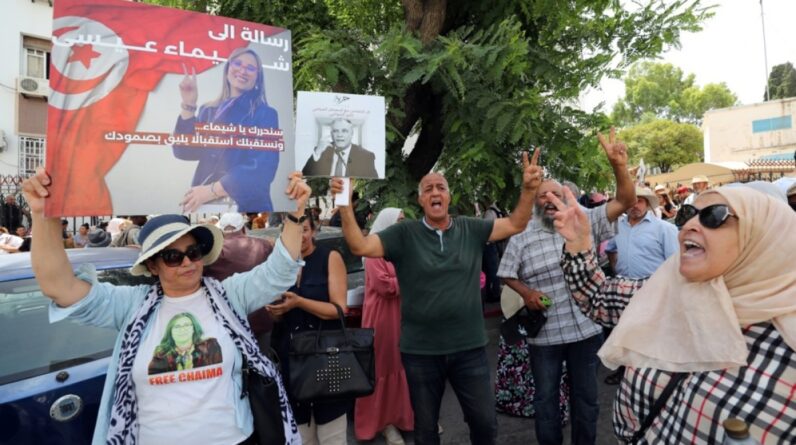
Chaima Issa and Lazhar Akremi released almost 5 months after their arrest for allegedly conspiring against state security.
A Tunisian judge has freed two prominent political opponents of President Kais Saied, nearly five months after they were arrested on suspicion of conspiring against state security, their lawyer Monia Bouali told Reuters news agency.
Chaima Issa and Lazhar Akremi were released on Thursday after their arrest in February along with 20 other political leaders in a crackdown on the country’s opposition. Both were accused of “conspiracy against the security of the State”.
Issa is a leader of the Salvation Front, the main opposition coalition to Saied that has organized protests against him for the past two years. Akremi, a lawyer who served as a minister after Tunisia’s 2011 revolution, has been a prominent critical voice against Saied.
Before the judge’s verdict, dozens of prisoners’ families protested near the court in Tunis, showing pictures of the detainees and demanding their release.
After his release from prison, Issa chanted: “Down with the coup. Down with Kais Saied”.
“The injustice against the rest of the prisoners must end… Imprisoning dissidents will not solve Tunisia’s problems,” Issa told Reuters.
first comment by Chaima Issa, the prominent political opponent of Kais Saied, in response to aa @Reuters he asks, immediately after leaving prison#Tunisia pic.twitter.com/TPP75YT9sm
— Tarek Amara (@amara_tarek) July 13, 2023
“I paid the price, but we have to go on,” he added.
Issa and Akremi’s defense team said in a statement that the investigating judge decided “to release Chaima Issa and also responded to the defense committee’s request to release Lazhar Akremi.”
The appeals court judge rejected the team’s request for the release of other political opponents.
The main opposition parties have denounced the arrests of their leaders as politically motivated, and rights groups have urged the authorities to release the detainees.
Saied has called them “terrorists” and traitors and says judges who release them would be abetting their alleged crimes.
Saied froze parliament and sacked the government in a dramatic move in July 2021 against the unique democracy emerging from the Arab Spring uprisings. He ruled by decree from September 2021 to March 2023, which he said was necessary to save the country from chaos and corruption.
Its critics have called the move a “coup”, while human rights groups have condemned a “witch hunt” aimed at “suppressing” freedom of opinion in the North African country.
In addition to the political crisis triggered by Saied’s takeover, Tunisia has been rocked by a serious financial crisis and is looking for foreign aid.
On Wednesday, European parliamentarians expressed their opposition to any “unconditional agreement” between the European Union and Tunisia, citing Saied’s “excesses”.
They called on the Tunisian authorities to “release the arbitrarily imprisoned opponents, defend the rights of Tunisian citizens and support their struggle for democracy.”
[ad_2]
Source link





